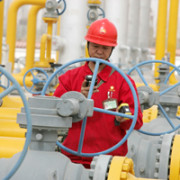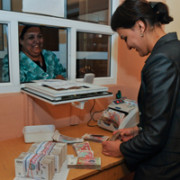Archive | February, 2015
Finance sector development
 Economics
Economics
 Finance sector development
Finance sector development
 Industry and trade, Regional cooperation and integration
Industry and trade, Regional cooperation and integration
 Industry and trade
Industry and trade
 Finance sector development
Finance sector development

“Grexit” and yuan devaluation could put significant pressure on Asian currency pegs

Already driving a housing bubble in all major Asian cities from Seoul to Jakarta, significant hot money inflows are what Hong Kong, China and Singapore seek to avoid. However, Greece’s exit from the eurozone coupled with subsequent quantitative easing by the People’s Republic of China (PRC) to jump-start flagging growth could quickly exacerbate this Asian dynamic.
What’s behind the recent oil price drop?

The price of oil has more than halved in the period of less than 5 months since September 2014. After nearly 5 years of stability, the price of a barrel of Brent crude oil in Europe fell from $117.15 on 6 September 2014, to $45.13 on 14 January 2015. Figure 1 shows the movements in the spot price of crude oil from June 2009 to February 2015, including the recent price drop.
Why do we need financial education in Asia?

This article assesses the case for promoting financial education in Asia. It argues that the benefits of investing in financial education can be substantial. Data are limited, but indicate low financial literacy scores for selected Asian countries. As economies develop, access to financial products and services will increase, but households and small and medium-sized enterprises (SMEs) need to be able to use the products and services wisely and effectively. More effective management of savings and investment can contribute to overall economic growth. Moreover, as societies age and fiscal resources become stretched, households will become increasingly responsible for their own retirement planning. Asia’s evolving experience suggests that more national surveys of financial literacy are needed and that coherent, tailored national strategies for financial education are essential for success.
AEC is due—but what about institutions?

A pressing policy question facing Association of Southeast Asian Nations (ASEAN) leaders at their summit in April 2015 and beyond is whether the ASEAN Economic Community (AEC) can be sustained without more effective institutions. This article explores the link between achieving the AEC agenda and institutional effectiveness. To remedy the implementation gridlock, it proposes reforms to the leadership and the technical level of ASEAN bodies, prioritization of new institutions, an effective monitoring mechanism, and an empowered ASEAN Secretariat.
Plurilateral trade agreements: an overlooked but powerful force for international trade opening for Asia?

After over a gloomy decade of inconclusive talks, a small but important step was taken in early December 2014 to finish the Doha Round negotiations of the World Trade Organization (WTO). In 2015 and beyond, actions to arrive at a Doha Round Agreement should be accompanied by embracing new plurilateral trade agreements within the WTO. This move can benefit growth and development in Asia. This article reviews the outlook for the WTO Doha Round and examines the case for plurilateral trade agreements for Asia.
The financial sector needs to be driving the green transformation

Many Asian countries have set ambitious targets for climate change mitigation. Governments all over the region are devising green growth strategies, aiming to reconcile economic growth with low carbon emissions as well as trying to limit other forms of environmental degradation such as soil, water, and air pollution. What is needed is no less than a “green transformation” to put green growth at the heart of development (OECD 2013). To achieve such a green transformation, large investments will be needed in renewable energy generation, energy efficiency, smart transportation networks, and many other areas that will help the shift toward sustainable patterns of production and consumption.


Search
Subscribe / Connect to Asia Pathways
Subjects
- Agriculture and natural resources
- Blog
- Capacity development
- Climate change
- Economics
- Education
- Energy
- Environment
- Finance sector development
- Gender
- Governance and public sector management
- Health
- Industry and trade
- Information and Communications Technology
- Infrastructure
- Miscellaneous
- Population
- Poverty
- Private sector development
- Regional cooperation and integration
- Sanitation
- Social development and protection
- Transport
- Uncategorized
- Urban development
- Video Blog
- Water
Recent Posts
- Artificial intelligence: A new driver for inclusive growth and development?
- Increasing trust in cross-border e-commerce and artificial intelligence
- Enhancing access to maternal and newborn healthcare in developing Asia
- Can electric vehicles lead the way to a sustainable future?
- Mitigating climate-related sovereign risk to accelerate action on the climate emergency




Recent Comments